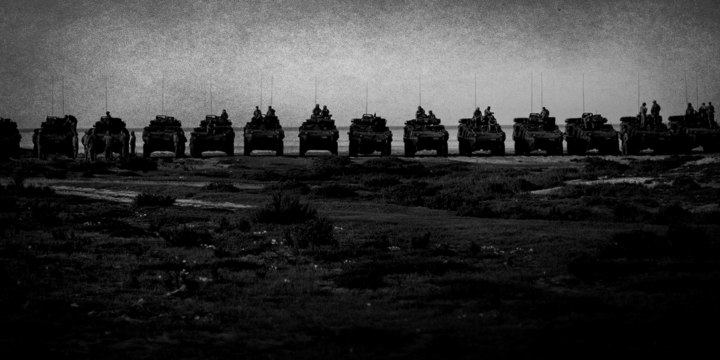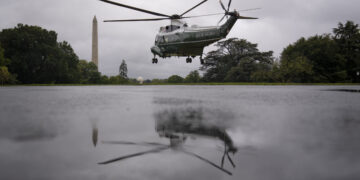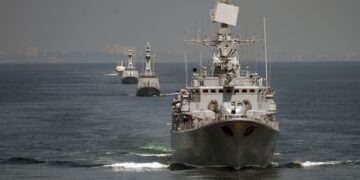November 23, 2020
“Great power competition” as an anachronism
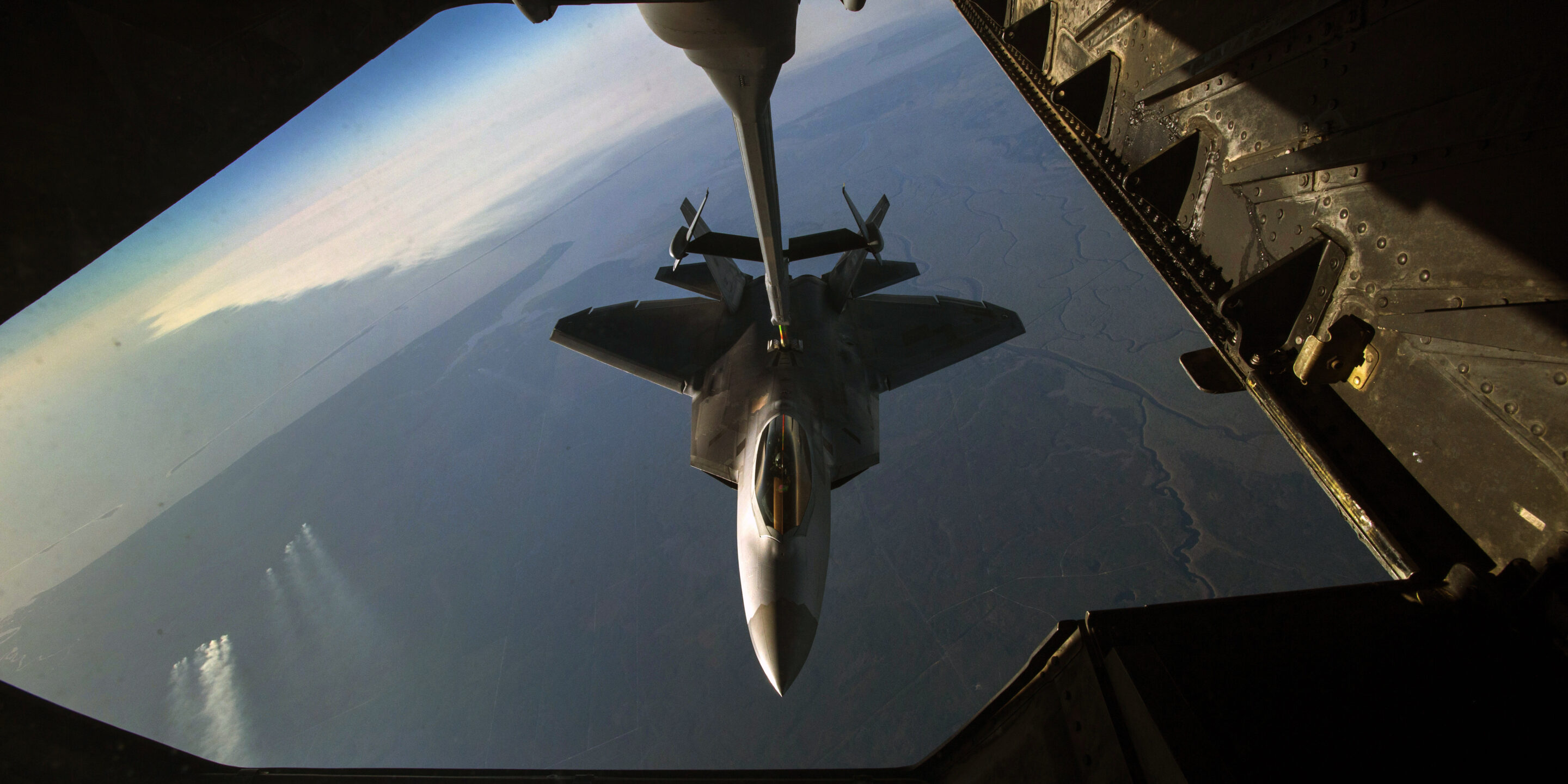
Key points
- The reasons traditionally given for engaging in great power competition, as defined by those advocating for a more militarily engaged foreign policy, no longer exist today. Other great powers do not covet the territory of the U.S. and the existence of nuclear weapons ensures that they never will. Moreover, military adventures in the developing world now tend to drain the resources of great powers rather than bring them benefits.
- Some U.S. officials and top opinion makers use the idea of great power competition to justify both American military involvement across the world and economic nationalism. They claim the U.S. needs a presence practically everywhere because otherwise China or Russia will fill any vacuum left behind or use increased power to enforce their values.
- Historically, great powers were in competition with each other because they either desired one another’s territory or sought to extract resources from colonies. This caused direct competition over land and often a security dilemma (zero-sum dynamics), in which each state feared the security of a rival power imperiled its own.
- Today, the idea of “great power competition” threatens to prevent collaboration on some of the most important issues facing humanity, such as climate change, pandemics, and artificial intelligence (AI) alignment.
- By scaling back military commitments in Eastern Europe and Asia, to promote burden sharing; relying on moral persuasion, rather than the threat of force, to spread American values; and seeking negotiated settlements in developing world conflicts, the U.S. can engage in more healthy forms of competition and focus on pursuing delinkage on issues like trade, climate, and human rights.
A fundamental break with the past
In February 2020, Secretary of Defense Mark Esper gave a speech at the Munich Security Conference announcing “we are now in an era of great power competition, with our principal challengers being China, then Russia, and … we must move away from low-intensity conflict and prepare once again for high-intensity warfare.”1Mark T. Esper, “As Prepared Remarks by Secretary of Defense Mark T. Esper at the Munich Security Conference,” U.S. Department of Defense, February 15, 2020, https://www.defense.gov/Newsroom/Speeches/Speech/Article/2085577/as-prepared-remarks-by-secretary-of-defense-mark-t-esper-at-the-munich-security/. The previous year, Secretary of State Mike Pompeo also mentioned “this new era of great power competition,” which meant the administration had “bolstered our military presence in the South China Sea” and taken steps to “stop China from stealing our stuff.”2Michael R. Pompeo, “A Foreign Policy From the Founding,” U.S. Department of State, May 11, 2019, https://www.state.gov/remarks-at-the-claremont-institute-40th-anniversary-gala-a-foreign-policy-from-the-founding/.
According to Elbridge Colby and A. Wess Mitchell, former U.S. officials and cofounders of The Marathon Initiative, “the United States is gearing up for a new era—one marked not by unchallenged U.S. dominance but by a rising China and a vindictive Russia seeking to undermine U.S. leadership and refashion global politics in their favor.”3Elbridge A. Colby and A. Wess Mitchell, “The Age of Great-Power Competition: How the Trump Administration Refashioned American Strategy,” Foreign Affairs 99 (2020): 118–30, https://www.foreignaffairs.com/articles/2019-12-10/age-great-power-competition.
Although not all who use the phrase “great power competition” advocate a more militarily assertive foreign policy, in practice the term represents a view of the world that is to a great extent zero-sum, in which the U.S. must constantly confront China and Russia abroad.
This mindset influences military and economic planning throughout the government. In January 2020, Gen. Stephen Townsend, Commander of U.S. Africa Command, testified before Congress on his mission, telling legislators, “China and Russia have long recognized the strategic and economic importance of Africa, and continue to seize opportunities to expand their influence across the continent.”4Stephen J. Townsend, “Statement of General Stephen J. Townsend, United States Army Commander, United States Africa Command, Before the Senate Armed Services Committee,” January 30, 2020, https://www.armed-services.senate.gov/imo/media/doc/Townsend_01-30-20.pdf. General Townsend says that he rejects the phrase “Great Power Competition” because he does not want to grant other countries the same status as the U.S., but the ideas are the same, regardless of how we refer to China and Russia. Despite an entire paragraph appearing under the heading of “Global Power Competition,” nowhere does the general say exactly for what the U.S. is competing with China and Russia. While the U.S. seeks “the benefit of all Africans,” and the other powers engage in “coercive and exploitative activities,” one is left to wonder what each side is trying to gain—and why the interests of the U.S. and those of China and Russia conflict.
This testimony is typical of justifications put forth by interventionists for their preferred policies. Commentators regularly talk about one policy or another of the Trump administration being a “gift to Putin,” including pulling out of the Open Skies Treaty,5David A. Andelman, “Trump Is About to Give Putin Another Gift,” CNN, October 24, 209, https://www.cnn.com/2019/10/24/opinions/trump-gives-putin-gift-open-skies-andelman/index.html. adopting neomercantilism,6Christopher Rhodes, “Trump’s Real Gift to Putin and Russia Isn’t Collusion,” National Interest, February 8, 2020, https://nationalinterest.org/feature/trump%E2%80%99s-real-gift-putin-and-russia-isnt-collusion-121246. privatizing American foreign policy,7Michael McFaul, “Trump’s Gift to Putin,” Foreign Affairs, October 23, 2019, https://www.foreignaffairs.com/articles/russian-federation/2019-10-23/trumps-gift-putin. killing Iranian IRGC Gen. Qassem Soleimani,8Dennis Ross, “Why Soleimani’s Killing Is a Gift to Vladimir Putin,” Washington Post, January 11, 2020, https://www.washingtonpost.com/opinions/2020/01/11/why-soleimanis-killing-is-gift-vladimir-putin/. withdrawing from the Joint Comprehensive Plan of Action (JCPOA, or Iran nuclear deal),9David A. Andelman, “Trump’s Iran Decision Gives Unexpected Gift to Putin,” Reuters, May 15, 2018, https://www.reuters.com/article/us-andelman-russia-commentary/commentary-trumps-iran-decision-gives-unexpected-gift-to-putin-idUSKCN1IG2Y7. and criticizing NATO.10Philip Gordon and Ivo Daalder, “Trump’s Biggest Gift to Putin,” Atlantic, July 19, 2018, https://www.theatlantic.com/international/archive/2018/07/american-commitments-nato-trump/565601/. The implication of such arguments is that anything the U.S. does on the world stage should be seen as part of its rivalry with Russia. In a way, this is understandable, as great power competition is one of the oldest and most important topics in the field of political science. The worldview that sees the U.S. in competition with its assumed “rivals” is also taken for granted in American national security documents, the testimony of top officials, journalistic reporting, and the halls of Congress.
Total bilateral trade and nuclear warheads of the U.S., Russia, and China
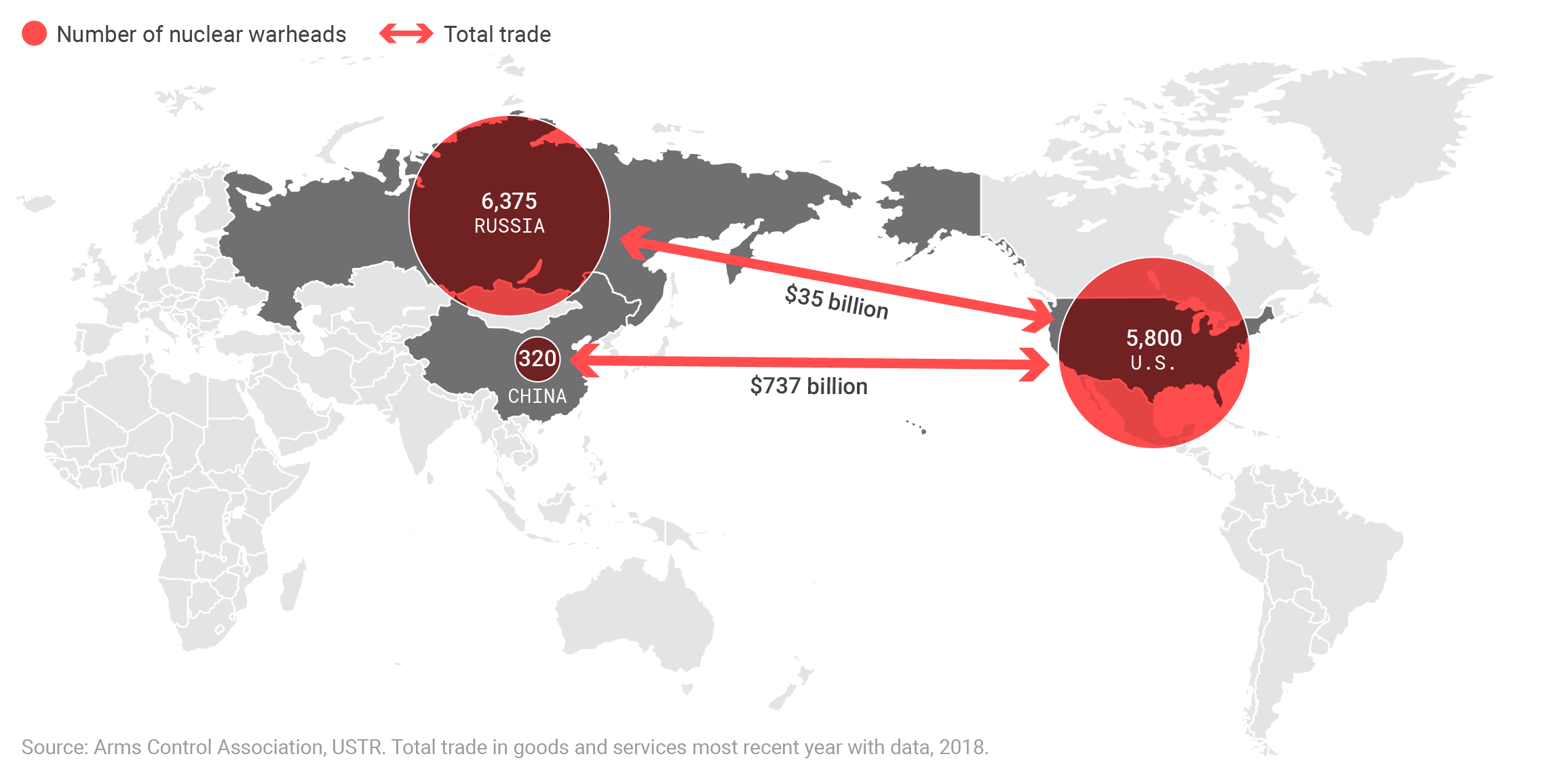
There are constructive reasons, such as trade, why the U.S. should seek to avoid war with Russia and China, and there are potentially destructive reasons, such as the threat of escalation into nuclear war.
Advocates of the theory of great power rivalry often point to the past to validate their claims; powerful states have competed and gone to war throughout all of recorded history and, the argument goes, it is naive to expect that to change. Even if, however, we accept that great power competition has been constant across time, this does not preclude the possibility of a fundamental break with the past. Other phenomena we might have expected to always be with us have all but disappeared in recent centuries, including chattel slavery, dueling, and the exclusion of women from political leadership roles.
While history always has the potential to surprise us, fundamental changes in the international system make great power competition, at least as it is generally understood in Washington, an outdated concept. Rather, the nature of contemporary politics and the kinds of problems states face call for great power engagement; that is, working together when we can and keeping disagreements between the U.S. and other influential states narrowly focused on relevant differences. We can compete with other nations in terms of trade and exerting influence in areas where we disagree, without accepting a foreign policy that depends on maintaining a military edge or economic dominance as necessary or inevitable.
Most disagreements between the U.S. and the other great powers stem from Washington seeking to change the internal arrangements of China and Russia and to defend partners and allies in Eastern Europe or East Asia against perceived aggression. These disagreements are not an automatic result of international politics, as is often assumed, but are ideological and moral commitments held by American leaders.11For the view that great power competition is the result of systematic forces, see Kenneth Neal Waltz, Man, the State, and War: A Theoretical Analysis (New York: Columbia University Press, 2001); Graham Allison, Destined for War: Can America and China Escape Thucydides’s Trap? (New York: Houghton Mifflin Harcourt, 2017); Colby and Mitchell, “The Age of Great-Power Competition.” A belief that great power conflict is inevitable due to the rise of China or the nature of the Russian government represents a fundamental misunderstanding of international politics—and can become a self-fulfilling prophecy.
Should the U.S. not seek to change the governments of these states or intervene in their territorial disputes, great powers would be more likely to find ways to cooperate with one another on the most important issues facing humanity, including climate change, the threat of global pandemics, failed states, nuclear nonproliferation, and making sure advanced artificial intelligence serves, rather than subverts, the interests of humanity.12Jessica Taylor et al., “Alignment for Advanced Machine Learning Systems,” Machine Intelligence Research Institute, 2016, https://intelligence.org/files/AlignmentMachineLearning.pdf. Moreover, even if we do see it as a fundamental interest of the U.S. to defend free countries or promote human rights abroad, there is little reason to suspect an expansive U.S. military presence serves such goals. Thus, by believing and acting as if the U.S. is in a great power competition with China and Russia, American foreign policy makes cooperation more difficult to achieve for a limited payoff in terms of accomplishing national security goals or helping people abroad.
Great power competition in historical context
To understand why great power competition, in the sense of a necessarily conflictual relationship with China and Russia, does not describe current realities, it helps to reflect on what great powers historically competed for. In short, the answer is territory.
Even the most superficial understanding of world history makes clear that powerful nations have often seen one another as rivals. Ancient Egypt’s ambitions to drive into the Near East collided with those of the Hittites, Assyrians, and Babylonians. Ancient Rome at its peak extended as far west, south, and north as geography would allow, and as far east as the Persian Empire. Perhaps until the last few decades, while some eras were more or less violent than others, a state of permanent competition between the most powerful nations and empires in Europe and the Near East was usually taken as a given.
According to political scientist Mark Zacher, between 1648 and 1945 there were 92 conflicts over territory, with 82 percent of them resulting in the transfer of land.13Mark W. Zacher, “The Territorial Integrity Norm: International Boundaries and the Use of Force,” International Organization 55, no. 2 (2001): 215–250, https://www.cambridge.org/core/journals/international-organization/article/territorial-integrity-norm-international-boundaries-and-the-use-of-force/15BF1A39481DB3C8F0AE546938355CB4. Great powers would historically not only seize territory from one another, but they also—beginning most notably in the Age of Discovery, from the 15th century—started to colonize the vast swaths of the anarchic or weakly governed territories of Asia, Africa, Australia, and the Western Hemisphere. Acquiring colonies brought glory and economic advantage to the home country, at least in some cases, and perhaps just as important, prevented them from falling into the hands of rivals.
Frequency of great power wars by decade from 1500 to 2020
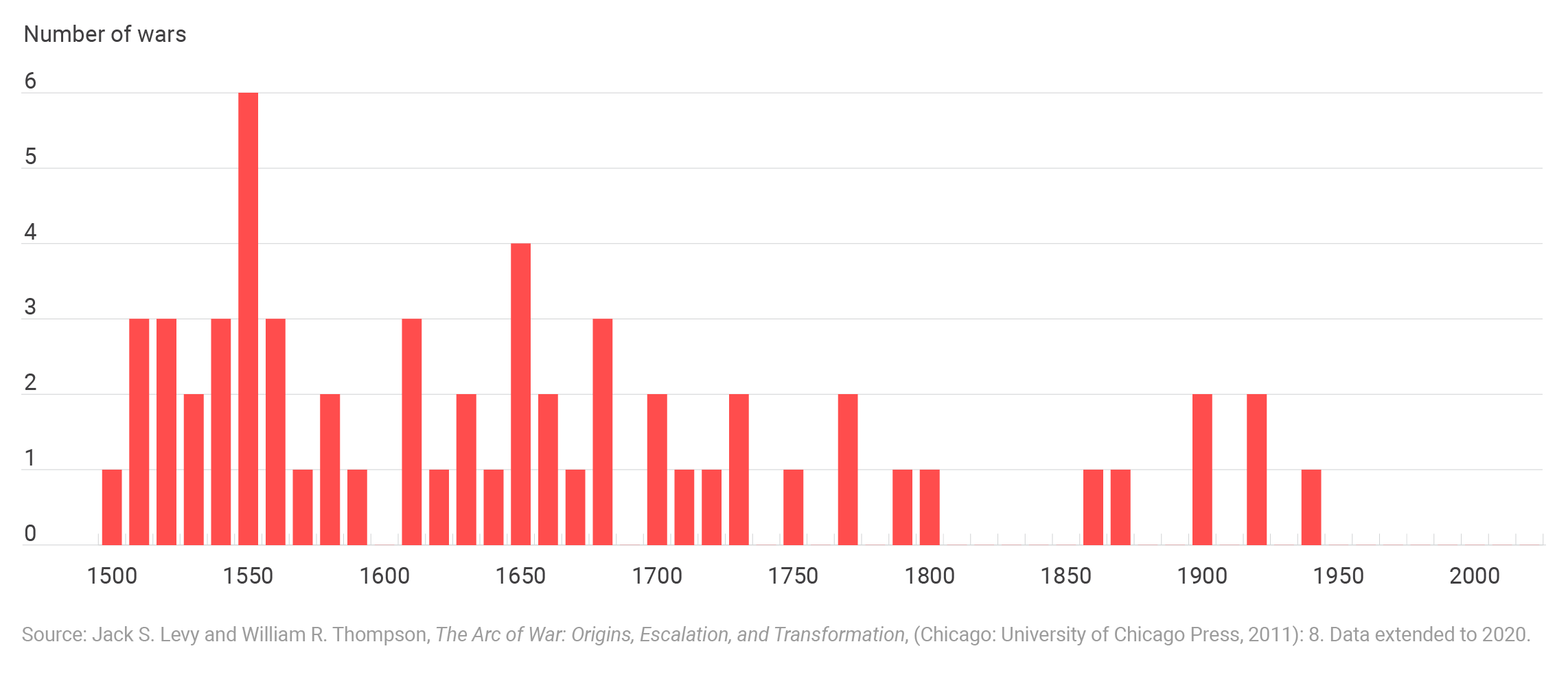
While great power wars frequently occurred in the past, there have been none since the first half of the twentieth century.
The fact that territory was so commonly won or lost in war had perverse consequences for international society. Scholars have shown how, even if two states seek to maintain the status quo, they can end up in competition. Since a country can never be certain about the intentions of a potential rival, a state might seek to take actions it perceives as defensive, which could in turn be seen as aggressive by an adversary.14Robert Jervis, “Cooperation Under the Security Dilemma,” World Politics 30, no. 2 (1978): 167–214; John J. Mearsheimer, The Tragedy of Great Power Politics (New York: W.W. Norton & Company, 2001). States all seek to preserve territory and any gain made by an opponent could be exploited to shift the balance of power in favor of a nation that, even if friendly today, might become an enemy tomorrow.
The desire to expand territorially and prevent others from doing the same had downstream effects in relationships between the great powers. To a large extent, states had to think about not only the absolute gains they would achieve through cooperation, but also their gains relative to those of rivals.15Robert Powell, “Absolute and Relative Gains in International Relations Theory,” American Political Science Review 85, no. 4 (1991): 1303–1320; Duncan Snidal, “International Cooperation among Relative Gains Maximizers,” International Studies Quarterly 35, no. 4 (1991): 387–402. Thus, the era of colonization and great power war was also the era of mercantilism: the regulation of a country’s industry in order to augment the power of the state.16Patrick O’Brien, “Mercantilism and Imperialism in the Rise and Decline of the Dutch and British Economies 1585–1815,” De Economist 148, no. 4 (2000): 469–501. Arms control was difficult to achieve, since reliable mechanisms for verification did not exist for most of recorded history, and was not even tried between countries at peace with one another with any vigor until the twentieth century.17Stuart Croft, Strategies of Arms Control: A History and Typology, (Manchester: Manchester University Press, 1996): 20–66. Great powers competed not only through their armed forces, but also economically and technologically since wealth could always be translated into military capabilities at a later date.
That in the past the most important states in the international system have tended to behave as rivals has been used by modern authors to claim great power competition must exist today and will always be with us.18Colby and Mitchell, “The Age of Great-Power Competition”; Mearsheimer, The Tragedy; Robert Kagan, The Return of History and the End of Dreams (New York: Vintage, 2009). There are two reasons to be skeptical of these claims, however.
Percent of time countries were at war against foreign enemies from 1500 to 1799

While European powers were at war among themselves at a high rate in earlier eras, this was not the case everywhere in the world. Frequent interstate conflict should not be the expected global norm today.
First, as political scientist David Kang points out, the idea of great power competition relies on a selective reading of history.19David C. Kang, East Asia Before the West: Five Centuries of Trade and Tribute (New York: Columbia University Press, 2010). While European powers were constantly at one another’s throats from the Middle Ages on, the East Asian nations of China, Korea, Vietnam, and Japan largely engaged in mutually beneficial trade and avoided conflict. This shows that the frequency and magnitude of interstate violence historically seen in the West may not be some kind of logical necessity deriving from the nature of international politics, but due to geographical or cultural circumstances specific to Europe.20Waltz, Man, the State, and War.
Moreover, according to defensive realists, great power competition is more likely when states are close to one another and share vulnerable borders.21Charles L. Glaser and Chaim Kaufmann, “What Is the Offense-Defense Balance and How Can We Measure It?” International Security 22, no. 4 (1998): 44–82, https://www.mitpressjournals.org/doi/abs/10.1162/isec.22.4.44#.WNrRN1UrKUk. Even offensive realists, who believe that states tend to maximize power by expansion, talk of the “stopping power of water,” or how oceans create natural barriers that prevent one side from dominating the other.22Mearsheimer, The Tragedy, 114–25. Due to its distance from other powers, the U.S., for most of its history, stayed out of European affairs and sought to expand and preserve its influence mostly throughout the Western Hemisphere alone. History thus places not only cultural and temporal but also geographical qualifications to the idea that great power competition has always been a universal feature of the international system.
The second reason not to rely too much on a pessimistic reading of the past for understanding the future is the possibility that something has changed fundamentally about the international system since the middle of the twentieth century. Of course, we should learn from history rather than ignore it. But in trying to analyze most phenomena it is usually acknowledged that the further back in history we go, the more dissimilarities we should expect to find between whatever era we focus on and the present.
When trying to understand the results of economic intervention or education policy in order to draw lessons about the world as it is today, it is useful to look for data that most resemble present circumstances—less useful is information from centuries past, if it is relevant at all. As professors Michael Spagat and Steven Pinker argue when discussing the continuing absence of interstate conflict, statistical evidence suggests analysts should consider the possibility that “parameters of the processes generating new wars and determining their magnitudes have changed since 1945,” making historical inquiry into the distant past less useful.23Michael Spagat and Steven Pinker, “Warfare,” Significance, June 6, 2016, 44.
Thus, history does not necessarily support the assumption that great power competition must always be present. Even if it did, this would not necessarily mean the past is prologue, given the almost countless number of changes the world has seen since 1945. A partial list would include the massive global decline in poverty, changing cultural ideas, the universal acceptance of the vast majority of the world’s borders, the decline of militarism, the existence of nuclear weapons, the spread of mass media, and new communications technologies and institutions that make constant dialogue between world leaders possible.24Stephen Van Evera, “Primed for Peace: Europe After the Cold War,” International Security 15, no. 3 (1990): 7–57; Steven Pinker, The Better Angels of Our Nature: Why Violence Has Declined (New York, Viking, 2011).
To understand whether great power competition is the correct lens through which to view international relations today, it is necessary to investigate what has changed in recent decades and whether the logic of previous centuries still applies.
Why competition does not need to mean conflict
States through most of history feared each other because they were competing for territory, thus making relations between them zero-sum. This competition inhibited areas of potential cooperation, including trade, arms control, and working to provide global common goods. Yet if great powers are no longer competing over territory, concerns about relative gains should diminish, allowing for reduced competition across a variety of dimensions.
Zacher’s work shows successful territorial conquest has all but disappeared. Russia’s seizure of Crimea is the only notable exception of the last few decades and, even here, most of the world refuses to recognize Moscow’s gain. Historically, war has been most common in eras in which borders were uncertain or contested; that is, the breakdown of empires.25Pinker, Better Angels. While we may debate how long the absence of interstate war and the territorial integrity norm should be expected to last globally, what is beyond question is that the U.S. itself has no territorial disputes with China or Russia.
Territory Europeans at one time controlled or conquered from 1492 to 1914
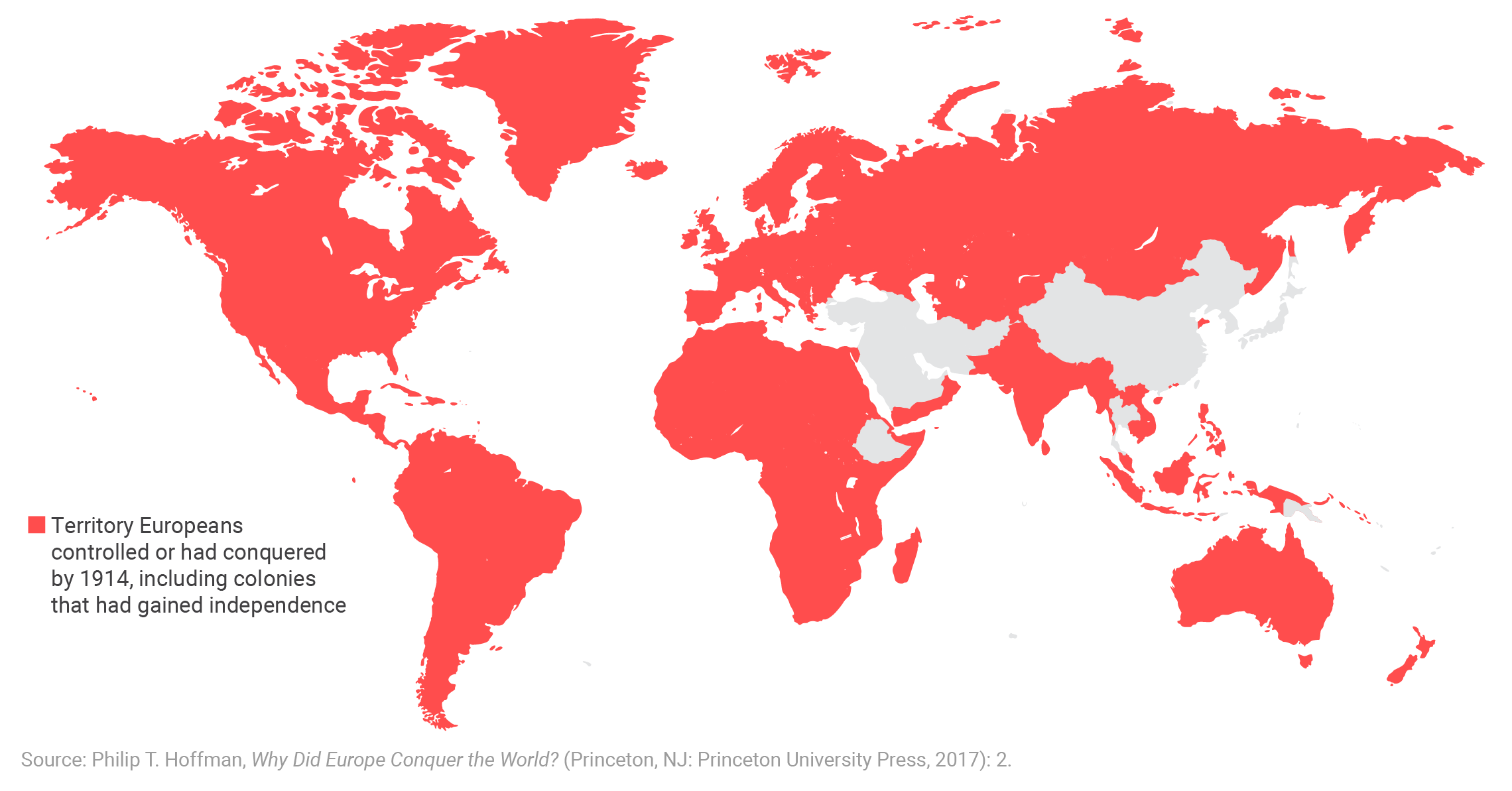
Colonialism and territorial state expansion by European powers since the fifteenth century touched most of the world before the twentieth century. Today, both are all but nonexistent.
Nuclear weapons help ensure the benefits of an attempted conquest will never be worth the cost, and there is nothing in history or geography that should be expected to naturally create frictions between the great powers today.26David Booth, “Marxism and Development Sociology: Interpreting the Impasse,” World Development 13, no. 7 (1985): 761–787. Thus the logic of the security dilemma is greatly diminished. Neither China nor Russia will ever conquer the U.S., nor any part of it, so there should be fewer security concerns over these countries growing economically stronger. Moreover, the security dilemma is less likely to exist when there are geographical barriers between powers, as greater distance makes offense more costly relative to defense and less likely to succeed.27Eugene Gholz, Benjamin Friedman, and Enea Gjoza, “Defensive Defense: A Better Way to Protect U.S. Allies in Asia,” Washington Quarterly 42, no. 4 (2019): 171–189, https://www.tandfonline.com/doi/full/10.1080/0163660X.2019.1693103. As realists often point out, China and the U.S. are separated by the Pacific Ocean, which may be considered the greatest geographical barrier in the world.28Charles Glaser, “Will China’s Rise Lead to War? Why Realism Does Not Mean Pessimism,” Foreign Affairs 90, no. 2 (March/April 2011): 80–91.
The disappearance of colonization removes another barrier to cooperation. While it may have been different in the past, today a military presence in the developing world tends to bring mostly costs and few benefits. In its occupation of Afghanistan, the Soviet Union lost more than 14,500 military personnel, with hundreds of thousands hospitalized.29David Campbell, Soviet Paratrooper Versus Mujahideen Fighter: Afghanistan 1979–89 (London: Bloomsbury Publishing, 2017): 72. The cost to the U.S. of the Afghanistan and Iraq wars runs into the trillions of dollars. Not even American business has benefited much—when Iraq auctioned its oil fields, U.S. companies were largely shut out to the benefit of China and Russia, although they have made gains in more recent years.30Carola Hoyos, “U.S. Oil Companies Lose Out in Iraq Auction,” Financial Times, December 13, 2019, https://www.ft.com/content/20016a3a-e81c-11de-8a02-00144feab49a. Instead of trying to expel their rivals from foreign lands, countries now just as often seek to tie them down in quagmires, as the U.S. did with the Soviet Union in Afghanistan and as Iran has done with U.S. forces in Iraq.
Powerful states are increasingly unable to dominate weaker adversaries even if they want to. International security scholar Ivan Arreguín-Toft finds that while in the nineteenth century the stronger side won in 80 percent of asymmetric conflicts, between 1950 and 1998, the weaker side won 55 percent of the time.31Ivan Arreguín-Toft, “How the Weak Win Wars: A Theory of Asymmetric Conflict,” International Security 26, no. 1 (2001): 93–128. Reasons for this include the rise of human rights norms and communication technologies that allow both rebels to promote nationalistic opposition to occupiers and journalists to report on atrocities committed in the course of putting down a guerilla movement.32Barry R. Posen, Restraint: A New Foundation for U.S. Grand Strategy (Ithaca: Cornell University Press, 2014): 24–68; Babak Bahador, The CNN Effect in Action: How the News Media Pushed the West Toward War in Kosovo (New York: Springer, 2007). Thus, more than ever, a military presence in a foreign country is a liability rather than a strength for the great powers.
The other great powers largely act based on the assumption there is little to gain from attempts at militarily dominating other countries across the world. Aside from a few cases, Russia has shown little interest in a military presence far from its borders. Its interventions have focused on territories that it has historical connections to, such as Syria and parts of the former Soviet Union, or been limited missions like its involvement in the Libyan civil war.
China has been even less interested in the kind of international ambitions advocated for by American interventionists, becoming by some measures the largest economy in the world and yet having only the most minimal military presence abroad.33Jeremy Page, Gordon Lubold, and Rob Taylor, “Deal for Naval Outpost in Cambodia Furthers China’s Quest for Military Network,” Wall Street Journal, June 22, 2019, https://www.wsj.com/articles/secret-deal-for-chinese-naval-outpost-in-cambodia-raises-u-s-fears-of-beijings-ambitions-11563732482. There is no interest among other nations in extensive nation building, like the U.S. has undertaken in Afghanistan and Iraq, nor even large-scale permanent troop deployments abroad in the mold of American bases in countries such as Germany and Japan. The U.S. has hundreds of military installations abroad, while every other country in the world combined has fewer than 30.34David Vine, Base Nation: How U.S. Military Bases Abroad Harm America and the World (New York: Metropolitan Books, 2015): 1–16.
While China seeks to dominate the South China Sea, such ambitions are quite limited compared to those of the U.S., which claimed the entire Western Hemisphere as part of its sphere of influence in the nineteenth century, and much of the rest of the world in the twentieth century.35John J. Mearsheimer, “The Gathering Storm: China’s Challenge to U.S. Power in Asia,” Chinese Journal of International Politics 3, no. 4 (2010): 381–396. It has been argued that great powers will necessarily seek to expand territorially and spread their values abroad, but the only example we have of a state doing so by force in recent decades is the U.S.—and the costs have been so obvious that no country today sees this aspect of American foreign policy as a model to emulate.36Hal Brands, “Democracy vs Authoritarianism: How Ideology Shapes Great-Power Conflict,” Survival 60, no. 5 (2018): 61–114.
While some warn of China providing a model of development that can serve as an alternative to capitalist democracy, not even those most pessimistic about Beijing’s intentions claim that it seeks to do so militarily.37Daniel Tobin, “How Xi Jinping’s ‘New Era’ Should Have Ended U.S. Debate on Beijing’s Ambitions,” Testimony before the U.S.-China Economic and Security Review Commission, March 13, 2020, https://www.uscc.gov/sites/default/files/testimonies/SFR%20for%20USCC%20TobinD%2020200313.pdf. Such efforts are in effect part of a public relations campaign, the success or failure of which will depend more on the relative successes of American and Chinese society than it will on factors such as the military balance of power.
Even if territorial conquest can still pay in the short run, in the long term it causes balancing coalitions in response, as even temporarily successful conquerors like Napoleon and Hitler have learned.38Peter Liberman, Does Conquest Pay? The Exploitation of Occupied Industrial Societies (Princeton, NJ: Princeton University Press, 1998). Great geographical distances compound the natural advantages of nations defending territory, and technological advances and patterns of Beijing’s military spending indicate, in the words of one analysis, recent “Chinese gains do little to aid advancing forces once they venture outside the well-protected area near China’s coast.”39Gholz, Friedman, and Gjoza. “Defensive Defense.”
Competition for values?
Another argument put forth by advocates of great power competition is the idea that the U.S. is in a competition with Russia and China over what kind of world we would like to live in. It is commonly said that the U.S. represents freedom, democracy, and capitalism, while China and Russia are promoting a world of dictatorships.40Gerald Chan, Pak K. Lee, and Lai-Ha Chan, China Engages Global Governance: A New World Order in the Making? (London: Routledge, 2011); Brands, “Democracy vs Authoritarianism,” 61–114; Jonathan Hillman, “A Chinese World Order,” Washington Post, July 23, 2018, https://www.washingtonpost.com/news/theworldpost/wp/2018/07/23/china-world-order/. According to H. R. McMaster, Chinese leaders “believe they have a narrow window of strategic opportunity to strengthen their rule and revise the international order in their favor….”41H. R. McMaster, “How China Sees the World,” Atlantic, May 2020, https://www.theatlantic.com/magazine/archive/2020/05/mcmaster-china-strategy/609088/. Thus, when they have the power to do so, the two autocratic powers will create new institutions and practices that are consistent with their own values.
U.S. vs. international trade contributions to China’s GDP growth
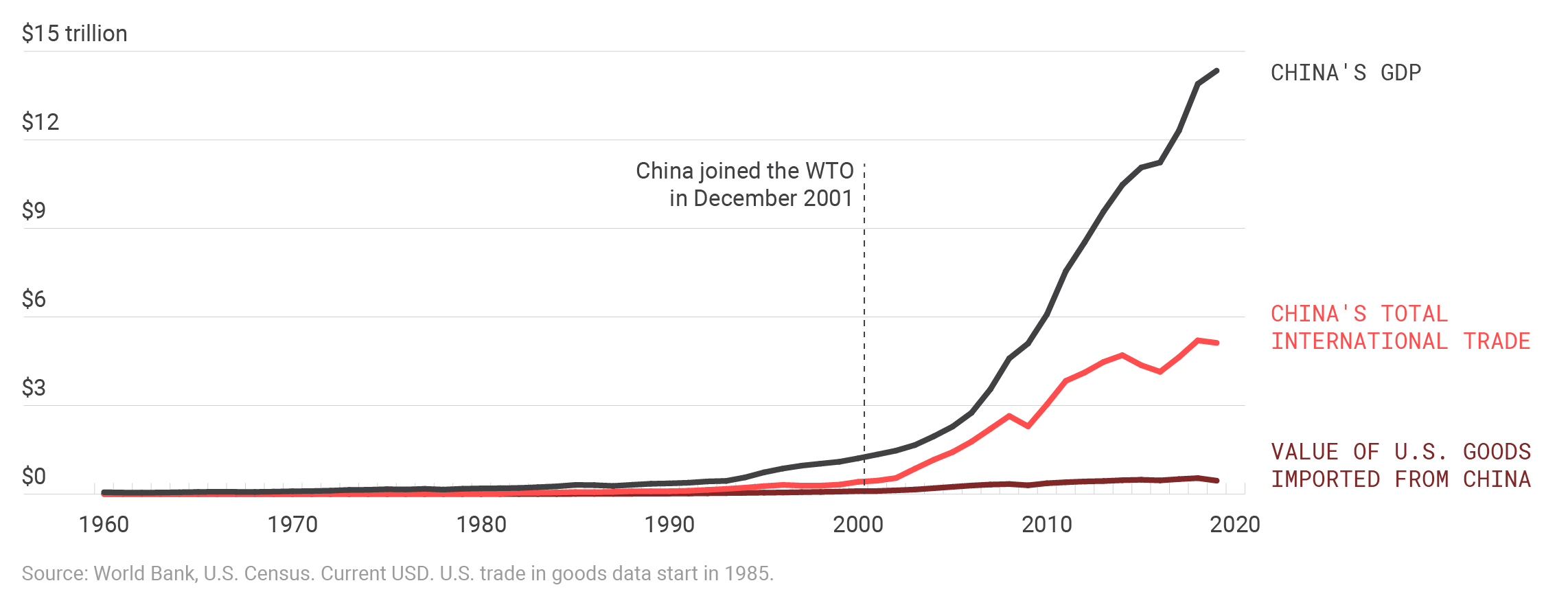
China’s economy has grown substantially in the last two decades, as it has opened its markets to the world. That growth has largely come in areas separate from U.S. purchases of Chinese goods.
Despite these kinds of assertions, there is little reason to suspect either country wants to overturn the institutions created to facilitate global cooperation. In fact, in major disputes with the U.S., these states are more likely to appeal to others to respect the rules of international society than they are to challenge them. To see why, it is important to understand that, in the years after the Second World War, international institutions were created on the basis of a respect for the sovereign equality of states.42Richard Hanania, “Norms Governing the Interstate Use of Force: Explaining the Status Quo of International Law,” Emory International Law Review 27 (2013): 829–905. As codified in the U.N. Charter, countries are prohibited from going to war with one another unless in self-defense or with the approval of the Security Council. Whatever one thinks of its motives, there is no escaping the fact that the U.S.—as the world’s most powerful nation—has most often violated this rule through innovations such as the unilateral “responsibility to protect” and “preventive war,” concepts that have been met with scorn by legal scholars.43Hanania, “Norms Governing the Interstate Use of Force”; Anne-Marie Slaughter, “An American Vision of International Law?” Proceedings of the ASIL Annual Meeting 97 (April 2003): 125–129. More often, it has simply sought to overturn disfavored governments covertly, which it has attempted to do more than any other country in the world, at least 64 times during the Cold War according to Lindsey O’Rourke.44Lindsey A. O’Rourke, Covert Regime Change: America’s Secret Cold War (Ithaca: Cornell University Press, 2018).
China has profited greatly from participation in the international economy over the last three decades, growing at a pace practically unprecedented in modern history and rising from a third-world nation to, by some measures, the largest economy in the world. While Russia has not done as well, it has improved its living standards substantially since the 1990s and seeks integration into the global economy more than to provide an alternative to it.45Nigel Gould-Davies, “Russia’s Sovereign Globalization: Rise, Fall and Future,” Chatham House, January 2016, https://www.chathamhouse.org/sites/default/files/publications/research/20160106RussiasSovereignGlobalizationGouldDaviesFinal.pdf. China sought admission to the WTO and saw the event as a great accomplishment, while Russia has protested its expulsion from the G8. There have been no attempts to create equivalent institutions, and while some worry about the Chinese “Belt and Road initiative,” there is a great deal of skepticism over the extent to which China could potentially be able to turn economic interdependence into political power.46Tyler Cowen, “‘Belt and Road’ Will Help the World. China? Not So Much,” Bloomberg, April 16, 2019, https://www.bloombergquint.com/view/china-s-belt-and-road-won-t-be-a-path-to-power. Even if it can, there is nothing that the U.S. can realistically do to prevent China from continuing to develop strong trading relationships with its neighbors and, consequently, achieve leverage it can use to accomplish political goals.
China and Russia therefore have little reason to challenge the major economic and security-based norms that form the pillars of the “rules-based international order.” Their only real incentive is to respond to the military alliances and newer concepts of human rights that may ultimately threaten their hold on power or ability to settle disputes with their neighbors on favorable terms.
Critics of China and Russia sometimes recognize this themselves, contradicting the arguments of those like Gen. McMaster by arguing the problem with these rivals is their view of international law is too conservative. In effect, this conflates defending American unilateralism with protecting a rules-based international order. Daniel Tobin of the Center for Strategic and International Studies testified to Congress in March that China seeks to create a world based on “mutual respect for each other’s territorial integrity and sovereignty, mutual nonaggression, mutual noninterference in each other’s internal affairs, equality and cooperation for mutual benefit, and peaceful coexistence.”47Tobin, “How Xi Jinping’s ‘New Era’ Should Have Ended.” Ted Piccione of the Brookings Institution warns of Beijing promoting “orthodox interpretations of national sovereignty and noninterference in internal affairs….”48Ted Piccone, “China’s Long Game on Human Rights at the United Nations,” Brookings Institution, April 2018, https://www.brookings.edu/research/chinas-long-game-on-human-rights-at-the-united-nations/. While an emphasis on sovereignty and noninterference are the basis of international law, such critics portray these positions as a dangerous deviation from accepted practices.
The U.S. may or may not decide it has a moral obligation to stand with governments like those of Taiwan and Ukraine and citizens within China and Russia who suffer from human rights abuses. Nevertheless, if protecting other countries and foreign civilians should be a major U.S. foreign policy goal, then the case should be made directly. One should not pretend that China or Russia directly threatens the U.S., nor that they fundamentally seek a different world order.
The security, wealth, and safety of the U.S. are not threatened by what happens in Ukraine or Estonia. If America should nonetheless defend those countries out of humanitarian or moral considerations, then the idea of “great power competition” is misleading: a diversion and excuse for a militarized foreign policy in service to unrelated goals.
The balance of military power and high-profile successes and failures in foreign policy have often had little influence on the major events of great power relations since 1945. As political scientist John Mearsheimer has pointed out, the Vietnam War was justified on the grounds of the “domino theory”: Once South Vietnam fell, communism would be more likely to triumph elsewhere. Yet only 15 years after America’s loss in Indochina, the Berlin Wall collapsed, and the U.S. won the Cold War.49John Mearsheimer, The Great Delusion: Liberal Dreams and International Realities, (New Haven: Yale University Press, 2018): 226–227.
The dissolution of the Soviet Union similarly does not accord with a theory holding that military competition and increasing American power is the best way to reform foreign societies. The end of that empire was completely voluntary—at the time of its collapse, leaders in Moscow controlled the most powerful and suppressive military-intelligence apparatus in human history, faced no widespread disruptions, and no mutinies in their armed forces.50Stephen Kotkin, Armageddon Averted: The Soviet Collapse, 1970–2000 (Oxford: Oxford University Press, 2008): 3–5; John Mueller, “What Was the Cold War About? Evidence from Its Ending,” Political Science Quarterly 119, no. 4 (2004): 609–631. The U.S. won the Cold War because Soviet leadership under Gorbachev became convinced communism was a flawed system not worth saving. While throughout the Cold War governments may have worried about relative power, in the end, such calculations were less relevant than the ideological convictions and motivations of Soviet leaders, who were no less capable of putting down an uprising in Eastern Europe in 1989 than they were in 1956 when they sent tanks into Hungary.51Mueller, “What Was the Cold War About?” China’s move away from central planning to a more market-based economy similarly did not result from bottom-up pressure but from elites deciding to steer their country in a new direction after realizing the capitalist system was more likely to bring economic growth.
Progress on human rights will depend on shining a light on the worst abuses of foreign adversaries, rather than bullying them into adopting liberal values. Like the move away from central planning, greater respect for human rights across the world has usually been the result of technological and economic developments and moral suasion, not great powers using military and economic leverage to push for such goals.52Pinker, Better Angels; Samuel Moyn, The Last Utopia: Human Rights in History (Cambridge, MA: Harvard University Press, 2012). While brute force in the service of stopping abuses may work in isolated cases against relatively weak nations, there is no history of great powers influencing one another in the same way.
Zero-sum thinking is counterproductive in an era in which the U.S. seeks to win over public and elite opinion in foreign countries. Trying to use American power through economic pressure and the threat of military force to change the behavior or leadership of states has failed in countries like Iran, Cuba, and North Korea—there is little basis to expect such methods to succeed against great powers. The ability of the U.S. to spread democracy and human rights abroad through the use of American power is limited, and the desire to do so can harm our relations with foreign nations.
The case for great power engagement and delinkage
The U.S. has no territorial disputes with China or Russia. The only potential sources of conflict are over human rights and territories that are in the immediate vicinity of the other two great powers. Yet the ability of the U.S. to make progress on the former will not be the result of it achieving a favorable balance of power, but moral persuasion: shaming bad actors and setting a good example for the rest of the world. With regard to the issue of local conflicts, the U.S. interest in such disputes is slight. This is obvious in most foreign policy discussions, which is why calls to defend other democracies have to be tied to claims that China and Russia are seeking to create a new world order to be persuasive. That argument makes little sense given how much these two countries, particularly China, have benefited from current arrangements and their lack of interest in projecting power to distant nations.53Bruno Maçães, Belt and Road: A Chinese World Order (Oxford: Oxford University Press, 2019); McMaster, “How China Sees the World.”
A certain amount of great power competition is inevitable in the sense that sometimes disagreements will emerge, and relative power will be important in deciding how each issue will be resolved. Nonetheless, rejecting the conflictual aspect of great power competition means the U.S. does not see antagonism as fundamental to its relationship with China and Russia. Arguments that rely on zero-sum thinking, often unreflective and unclear about what the U.S. is trying to accomplish, should be rejected (i.e., pulling out of Syria as a “gift to Putin” or presenting Chinese investment in other nations as an instance of “imperialism”).
Discarding the idea of “great power competition” as necessarily conflictual—rather than the term referring to the inevitable consequence of a world composed of nations with different values and interests—calls for less zero-sum thinking, and more acknowledgement that disputes in one policy area do not have to poison relations more generally. It also means letting go of unfounded fears of a loss of economic or military influence. Understanding the U.S. will sometimes disagree with the practices of other countries, great power engagement suggests delinkage across various areas where there is the potential for cooperation. In other words, China and Russia should be treated like other nations: occasional friction should not cause us to overlook opportunities for mutual gain.
Given the existence of nuclear weapons and the lack of fundamental differences over territory, there are at least three implications of a change in mindset away from great power competition as conflict and toward more engagement and cooperation that can ultimately benefit humanity.
First, if it engages in conflict zones at all, the U.S. should work with other powers to leave behind functioning governments that can provide better lives for their people. That starts with not overthrowing governments in the first place, or trying to. Nowhere is the case for this clearer than the war in Syria, a conflict that some observers have portrayed as a zero-sum competition for influence. The logic of having to avoid giving “gifts to Putin” creates difficulties for any American president looking to dissolve unnecessary commitments in the Middle East. In reality, both the U.S. and Russia would like to see stability, the defeat of terrorist organizations, and a lower casualty count for their own military forces, Syrian soldiers, and civilians alike. While disagreements about how to get to that point will always exist, treating Russia as an adversary in Syria undermines U.S. interests and values by prolonging that nation’s civil war.54Richard Hanania, “Worse than Nothing: Why U.S. Intervention Made Government Atrocities More Likely in Syria.” Survival 62, no. 5 (2020): 173–192; Benjamin H. Friedman and Justin Logan, “Disentangling from Syria’s Civil War,” Defense Priorities, May 2019, https://www.defensepriorities.org/explainers/disentangling-from-syrias-civil-war.
Second, American leaders should pursue policies that encourage the neighbors of China and Russia to take more responsibility for their own defense. A U.S. that pushed those neighbors to maintain their independence by balancing would encourage them to build up their own defense capabilities, rather than rely on a permanent garrison of U.S. forces in Europe and East Asia. Given that there is little evidence that military control over their neighbors would ever serve as a stepping-stone to future invasions by China and Russia of other countries, much less U.S. territory, no argument that relies on national interests can justify allowing allies to continue to depend on American protection. Even if one does not want to let go of the American commitment to smaller countries, disagreements between the U.S. and the other great powers can be disputed on narrow grounds, centering around a few areas such as Taiwan and South Ossetia.
Finally, the U.S. should seek to promote human rights without the use or threat of sanctions or war. Research clearly shows economic pressure in the form of sanctions does not change state behavior, and this is especially likely with regard to another great power.55Richard Hanania, “Ineffective, Immoral, Politically Convenient: America’s Overreliance on Economic Sanctions, and What to Do about It,” Cato Institute Policy Analysis No. 884, February 18, 2020, https://www.cato.org/publications/policy-analysis/ineffective-immoral-politically-convenient-americas-overreliance. No one seriously contemplates war with China over its treatment of minorities such as the Uighurs; that leaves engagement and public pressure as the only option. For example, international pressure has been building over Chinese actions in Xinjiang in part due to reporting from the U.S. media, not steps taken to check the rise of China such as freedom of navigation operations or bans on telecom companies. While attempts at moral persuasion and shaming bad actors will not always succeed, it is the only alternative to war, which is unthinkable given the stakes involved, and to sanctions, which harm innocents abroad while having been shown not to work (and could cause lasting harm to the American-led global financial system).56Enea Gjoza, “Counting the Cost of Financial Warfare,” Defense Priorities, November 2019, https://www.defensepriorities.org/explainers/counting-the-cost-of-financial-warfare.
This is only a partial list of the implications of choosing great power engagement over confrontation. A review of major problems facing humanity indicates that rather than being mutual antagonists, the fates of the U.S. and other great powers are linked. As the COVID-19 pandemic has made clear, an outbreak in one part of the globe can quickly spread to others. The U.S. seeking to gain political advantage from the mistakes of other countries in areas like fighting disease, as some have tried to do with the coronavirus, is sure to lead to less transparency and cooperation when they are needed most.57Rachel Esplin Odell, “The U.S. Must Recognize That China Is Not a Monolith to Enable Cooperation Against COVID-19,” Responsible Statecraft, April 2, 2020, https://responsiblestatecraft.org/2020/04/03/us-must-recognize-that-china-is-not-a-monolith-covid-19/.
Likewise, in areas such as AI alignment, climate change, and the quest for sustainable economic growth, the interests of the great powers converge. Perhaps the greatest danger in the idea of great power competition is not that it will lead to war or a loss in potential gains from trade, but that it will sour relations to the point that it will create stumbling blocks to cooperation on pressing, if not existential, issues.
Before NATO expansion strained relations between the U.S. and Russia, there were more examples of productive cooperation. This included the Cooperative Threat Reduction Program, in which the U.S. helped dismantle the infrastructure of the WMD program of the former Soviet Union, and Gorbachev agreeing to support the resolutions to authorize the First Gulf War. Even today, there is interdependence between the American and Russian space programs, a mutually beneficial partnership that may now be threatened by tensions over other issues.58Marina Koren, “The Chill of U.S.-Russia Relations Creeps Into Space,” Atlantic, January 11, 2019, https://www.theatlantic.com/science/archive/2019/01/nasa-roscosmos-russia-bridenstine-rogozin/579973/.
The end of struggle over territory should be the end of a more conflictual kind of great power competition—and the catalyst for a reorientation toward a more collaborative international system better suited for the twenty-first century.
Endnotes
- 1Mark T. Esper, “As Prepared Remarks by Secretary of Defense Mark T. Esper at the Munich Security Conference,” U.S. Department of Defense, February 15, 2020, https://www.defense.gov/Newsroom/Speeches/Speech/Article/2085577/as-prepared-remarks-by-secretary-of-defense-mark-t-esper-at-the-munich-security/.
- 2Michael R. Pompeo, “A Foreign Policy From the Founding,” U.S. Department of State, May 11, 2019, https://www.state.gov/remarks-at-the-claremont-institute-40th-anniversary-gala-a-foreign-policy-from-the-founding/.
- 3Elbridge A. Colby and A. Wess Mitchell, “The Age of Great-Power Competition: How the Trump Administration Refashioned American Strategy,” Foreign Affairs 99 (2020): 118–30, https://www.foreignaffairs.com/articles/2019-12-10/age-great-power-competition.
- 4Stephen J. Townsend, “Statement of General Stephen J. Townsend, United States Army Commander, United States Africa Command, Before the Senate Armed Services Committee,” January 30, 2020, https://www.armed-services.senate.gov/imo/media/doc/Townsend_01-30-20.pdf. General Townsend says that he rejects the phrase “Great Power Competition” because he does not want to grant other countries the same status as the U.S., but the ideas are the same, regardless of how we refer to China and Russia.
- 5David A. Andelman, “Trump Is About to Give Putin Another Gift,” CNN, October 24, 209, https://www.cnn.com/2019/10/24/opinions/trump-gives-putin-gift-open-skies-andelman/index.html.
- 6Christopher Rhodes, “Trump’s Real Gift to Putin and Russia Isn’t Collusion,” National Interest, February 8, 2020, https://nationalinterest.org/feature/trump%E2%80%99s-real-gift-putin-and-russia-isnt-collusion-121246.
- 7Michael McFaul, “Trump’s Gift to Putin,” Foreign Affairs, October 23, 2019, https://www.foreignaffairs.com/articles/russian-federation/2019-10-23/trumps-gift-putin.
- 8Dennis Ross, “Why Soleimani’s Killing Is a Gift to Vladimir Putin,” Washington Post, January 11, 2020, https://www.washingtonpost.com/opinions/2020/01/11/why-soleimanis-killing-is-gift-vladimir-putin/.
- 9David A. Andelman, “Trump’s Iran Decision Gives Unexpected Gift to Putin,” Reuters, May 15, 2018, https://www.reuters.com/article/us-andelman-russia-commentary/commentary-trumps-iran-decision-gives-unexpected-gift-to-putin-idUSKCN1IG2Y7.
- 10Philip Gordon and Ivo Daalder, “Trump’s Biggest Gift to Putin,” Atlantic, July 19, 2018, https://www.theatlantic.com/international/archive/2018/07/american-commitments-nato-trump/565601/.
- 11For the view that great power competition is the result of systematic forces, see Kenneth Neal Waltz, Man, the State, and War: A Theoretical Analysis (New York: Columbia University Press, 2001); Graham Allison, Destined for War: Can America and China Escape Thucydides’s Trap? (New York: Houghton Mifflin Harcourt, 2017); Colby and Mitchell, “The Age of Great-Power Competition.”
- 12Jessica Taylor et al., “Alignment for Advanced Machine Learning Systems,” Machine Intelligence Research Institute, 2016, https://intelligence.org/files/AlignmentMachineLearning.pdf.
- 13Mark W. Zacher, “The Territorial Integrity Norm: International Boundaries and the Use of Force,” International Organization 55, no. 2 (2001): 215–250, https://www.cambridge.org/core/journals/international-organization/article/territorial-integrity-norm-international-boundaries-and-the-use-of-force/15BF1A39481DB3C8F0AE546938355CB4.
- 14Robert Jervis, “Cooperation Under the Security Dilemma,” World Politics 30, no. 2 (1978): 167–214; John J. Mearsheimer, The Tragedy of Great Power Politics (New York: W.W. Norton & Company, 2001).
- 15Robert Powell, “Absolute and Relative Gains in International Relations Theory,” American Political Science Review 85, no. 4 (1991): 1303–1320; Duncan Snidal, “International Cooperation among Relative Gains Maximizers,” International Studies Quarterly 35, no. 4 (1991): 387–402.
- 16Patrick O’Brien, “Mercantilism and Imperialism in the Rise and Decline of the Dutch and British Economies 1585–1815,” De Economist 148, no. 4 (2000): 469–501.
- 17Stuart Croft, Strategies of Arms Control: A History and Typology, (Manchester: Manchester University Press, 1996): 20–66.
- 18Colby and Mitchell, “The Age of Great-Power Competition”; Mearsheimer, The Tragedy; Robert Kagan, The Return of History and the End of Dreams (New York: Vintage, 2009).
- 19David C. Kang, East Asia Before the West: Five Centuries of Trade and Tribute (New York: Columbia University Press, 2010).
- 20Waltz, Man, the State, and War.
- 21Charles L. Glaser and Chaim Kaufmann, “What Is the Offense-Defense Balance and How Can We Measure It?” International Security 22, no. 4 (1998): 44–82, https://www.mitpressjournals.org/doi/abs/10.1162/isec.22.4.44#.WNrRN1UrKUk.
- 22Mearsheimer, The Tragedy, 114–25.
- 23Michael Spagat and Steven Pinker, “Warfare,” Significance, June 6, 2016, 44.
- 24Stephen Van Evera, “Primed for Peace: Europe After the Cold War,” International Security 15, no. 3 (1990): 7–57; Steven Pinker, The Better Angels of Our Nature: Why Violence Has Declined (New York, Viking, 2011).
- 25Pinker, Better Angels.
- 26David Booth, “Marxism and Development Sociology: Interpreting the Impasse,” World Development 13, no. 7 (1985): 761–787.
- 27Eugene Gholz, Benjamin Friedman, and Enea Gjoza, “Defensive Defense: A Better Way to Protect U.S. Allies in Asia,” Washington Quarterly 42, no. 4 (2019): 171–189, https://www.tandfonline.com/doi/full/10.1080/0163660X.2019.1693103.
- 28Charles Glaser, “Will China’s Rise Lead to War? Why Realism Does Not Mean Pessimism,” Foreign Affairs 90, no. 2 (March/April 2011): 80–91.
- 29David Campbell, Soviet Paratrooper Versus Mujahideen Fighter: Afghanistan 1979–89 (London: Bloomsbury Publishing, 2017): 72.
- 30Carola Hoyos, “U.S. Oil Companies Lose Out in Iraq Auction,” Financial Times, December 13, 2019, https://www.ft.com/content/20016a3a-e81c-11de-8a02-00144feab49a.
- 31Ivan Arreguín-Toft, “How the Weak Win Wars: A Theory of Asymmetric Conflict,” International Security 26, no. 1 (2001): 93–128.
- 32Barry R. Posen, Restraint: A New Foundation for U.S. Grand Strategy (Ithaca: Cornell University Press, 2014): 24–68; Babak Bahador, The CNN Effect in Action: How the News Media Pushed the West Toward War in Kosovo (New York: Springer, 2007).
- 33Jeremy Page, Gordon Lubold, and Rob Taylor, “Deal for Naval Outpost in Cambodia Furthers China’s Quest for Military Network,” Wall Street Journal, June 22, 2019, https://www.wsj.com/articles/secret-deal-for-chinese-naval-outpost-in-cambodia-raises-u-s-fears-of-beijings-ambitions-11563732482.
- 34David Vine, Base Nation: How U.S. Military Bases Abroad Harm America and the World (New York: Metropolitan Books, 2015): 1–16.
- 35John J. Mearsheimer, “The Gathering Storm: China’s Challenge to U.S. Power in Asia,” Chinese Journal of International Politics 3, no. 4 (2010): 381–396.
- 36Hal Brands, “Democracy vs Authoritarianism: How Ideology Shapes Great-Power Conflict,” Survival 60, no. 5 (2018): 61–114.
- 37Daniel Tobin, “How Xi Jinping’s ‘New Era’ Should Have Ended U.S. Debate on Beijing’s Ambitions,” Testimony before the U.S.-China Economic and Security Review Commission, March 13, 2020, https://www.uscc.gov/sites/default/files/testimonies/SFR%20for%20USCC%20TobinD%2020200313.pdf.
- 38Peter Liberman, Does Conquest Pay? The Exploitation of Occupied Industrial Societies (Princeton, NJ: Princeton University Press, 1998).
- 39Gholz, Friedman, and Gjoza. “Defensive Defense.”
- 40Gerald Chan, Pak K. Lee, and Lai-Ha Chan, China Engages Global Governance: A New World Order in the Making? (London: Routledge, 2011); Brands, “Democracy vs Authoritarianism,” 61–114; Jonathan Hillman, “A Chinese World Order,” Washington Post, July 23, 2018, https://www.washingtonpost.com/news/theworldpost/wp/2018/07/23/china-world-order/.
- 41H. R. McMaster, “How China Sees the World,” Atlantic, May 2020, https://www.theatlantic.com/magazine/archive/2020/05/mcmaster-china-strategy/609088/.
- 42Richard Hanania, “Norms Governing the Interstate Use of Force: Explaining the Status Quo of International Law,” Emory International Law Review 27 (2013): 829–905.
- 43Hanania, “Norms Governing the Interstate Use of Force”; Anne-Marie Slaughter, “An American Vision of International Law?” Proceedings of the ASIL Annual Meeting 97 (April 2003): 125–129.
- 44Lindsey A. O’Rourke, Covert Regime Change: America’s Secret Cold War (Ithaca: Cornell University Press, 2018).
- 45Nigel Gould-Davies, “Russia’s Sovereign Globalization: Rise, Fall and Future,” Chatham House, January 2016, https://www.chathamhouse.org/sites/default/files/publications/research/20160106RussiasSovereignGlobalizationGouldDaviesFinal.pdf.
- 46Tyler Cowen, “‘Belt and Road’ Will Help the World. China? Not So Much,” Bloomberg, April 16, 2019, https://www.bloombergquint.com/view/china-s-belt-and-road-won-t-be-a-path-to-power.
- 47Tobin, “How Xi Jinping’s ‘New Era’ Should Have Ended.”
- 48Ted Piccone, “China’s Long Game on Human Rights at the United Nations,” Brookings Institution, April 2018, https://www.brookings.edu/research/chinas-long-game-on-human-rights-at-the-united-nations/.
- 49John Mearsheimer, The Great Delusion: Liberal Dreams and International Realities, (New Haven: Yale University Press, 2018): 226–227.
- 50Stephen Kotkin, Armageddon Averted: The Soviet Collapse, 1970–2000 (Oxford: Oxford University Press, 2008): 3–5; John Mueller, “What Was the Cold War About? Evidence from Its Ending,” Political Science Quarterly 119, no. 4 (2004): 609–631.
- 51Mueller, “What Was the Cold War About?”
- 52Pinker, Better Angels; Samuel Moyn, The Last Utopia: Human Rights in History (Cambridge, MA: Harvard University Press, 2012).
- 53Bruno Maçães, Belt and Road: A Chinese World Order (Oxford: Oxford University Press, 2019); McMaster, “How China Sees the World.”
- 54Richard Hanania, “Worse than Nothing: Why U.S. Intervention Made Government Atrocities More Likely in Syria.” Survival 62, no. 5 (2020): 173–192; Benjamin H. Friedman and Justin Logan, “Disentangling from Syria’s Civil War,” Defense Priorities, May 2019, https://www.defensepriorities.org/explainers/disentangling-from-syrias-civil-war.
- 55Richard Hanania, “Ineffective, Immoral, Politically Convenient: America’s Overreliance on Economic Sanctions, and What to Do about It,” Cato Institute Policy Analysis No. 884, February 18, 2020, https://www.cato.org/publications/policy-analysis/ineffective-immoral-politically-convenient-americas-overreliance.
- 56Enea Gjoza, “Counting the Cost of Financial Warfare,” Defense Priorities, November 2019, https://www.defensepriorities.org/explainers/counting-the-cost-of-financial-warfare.
- 57Rachel Esplin Odell, “The U.S. Must Recognize That China Is Not a Monolith to Enable Cooperation Against COVID-19,” Responsible Statecraft, April 2, 2020, https://responsiblestatecraft.org/2020/04/03/us-must-recognize-that-china-is-not-a-monolith-covid-19/.
- 58Marina Koren, “The Chill of U.S.-Russia Relations Creeps Into Space,” Atlantic, January 11, 2019, https://www.theatlantic.com/science/archive/2019/01/nasa-roscosmos-russia-bridenstine-rogozin/579973/.
More on Eurasia
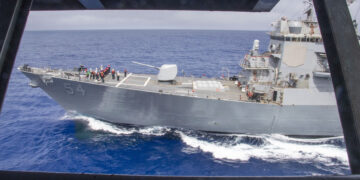
By John Mueller
April 10, 2025

Featuring Lyle Goldstein
April 1, 2025
Events on Grand strategy

